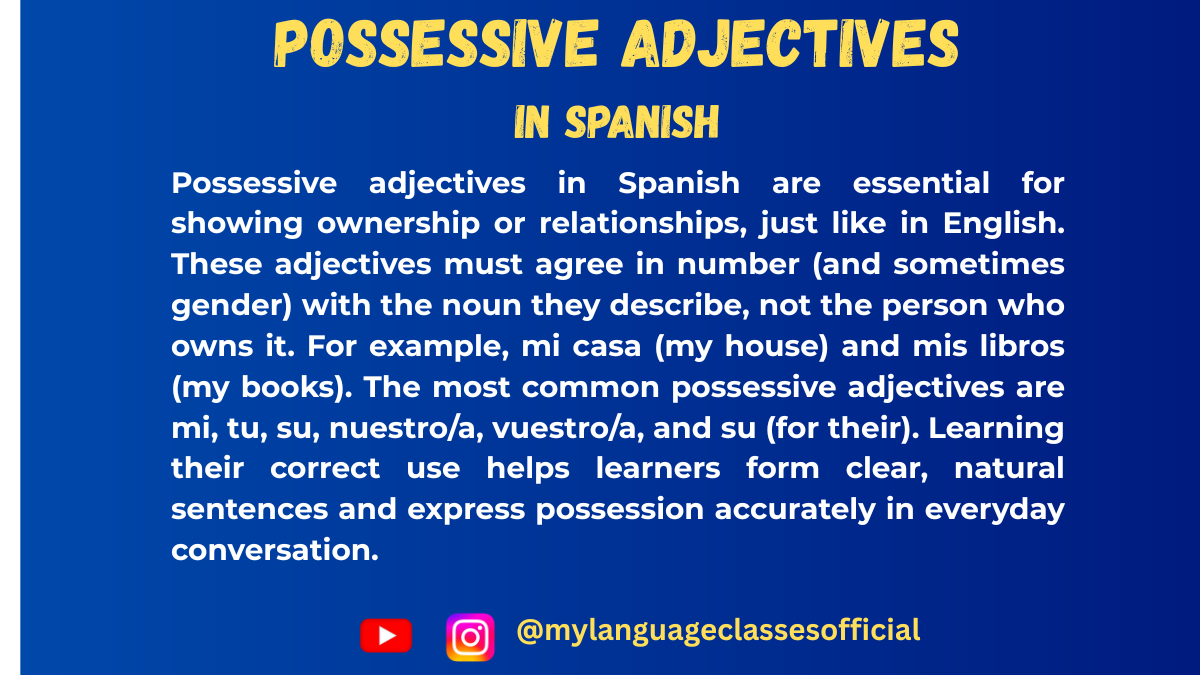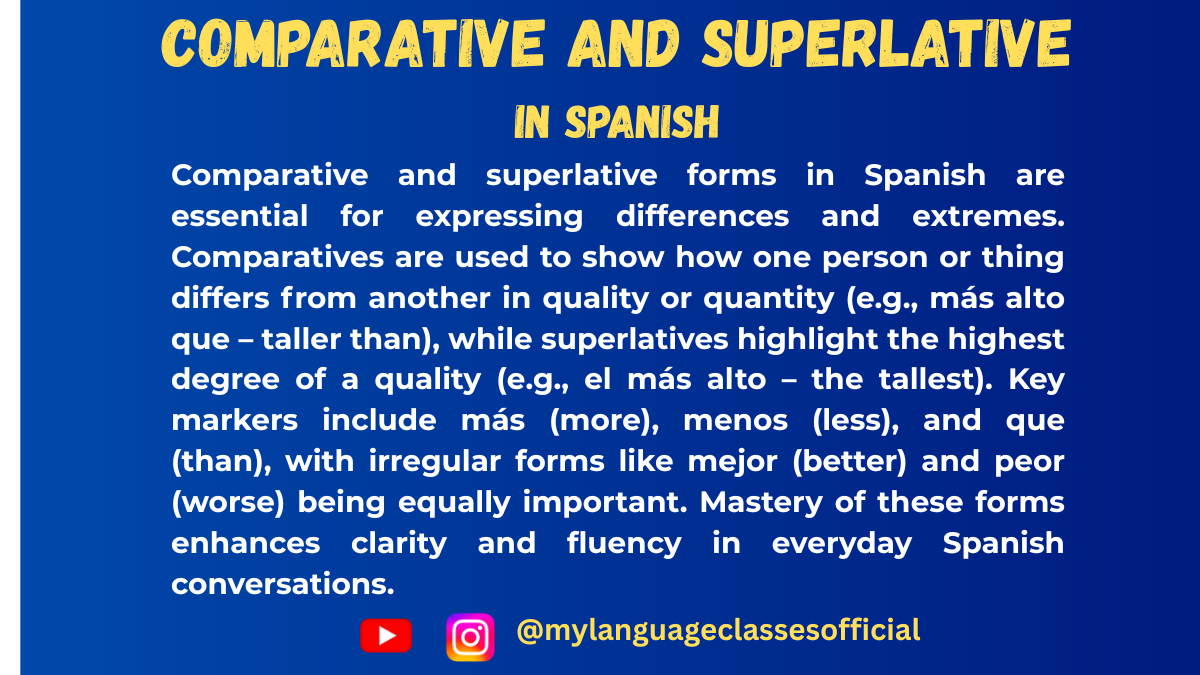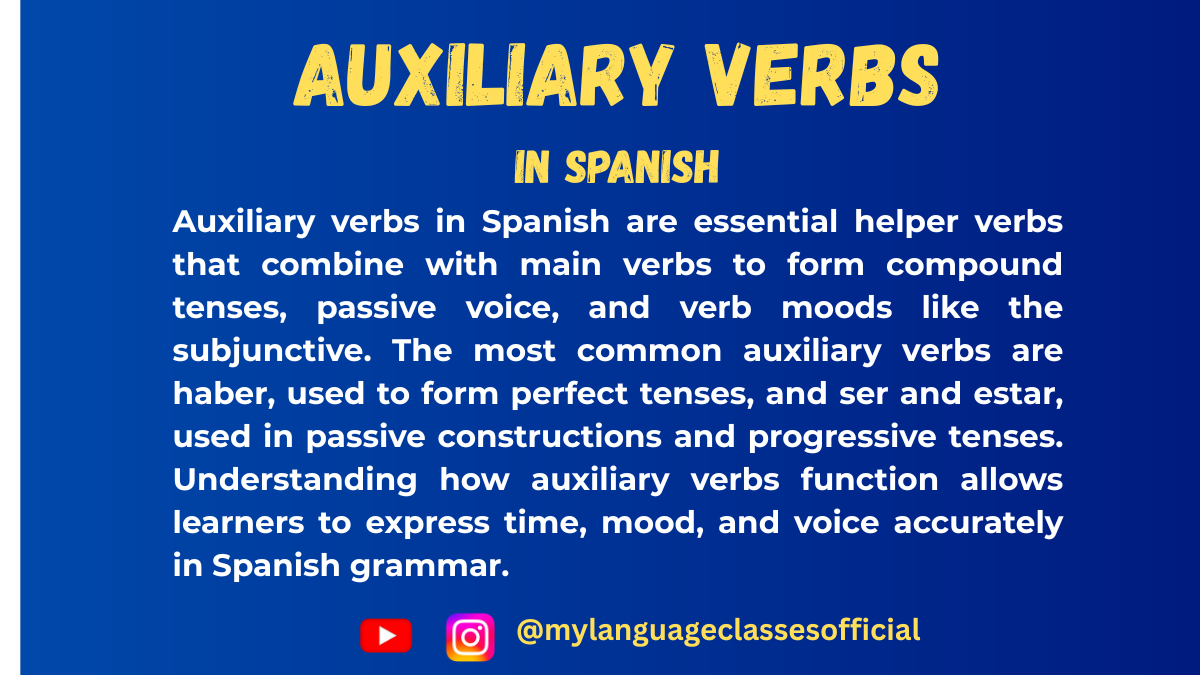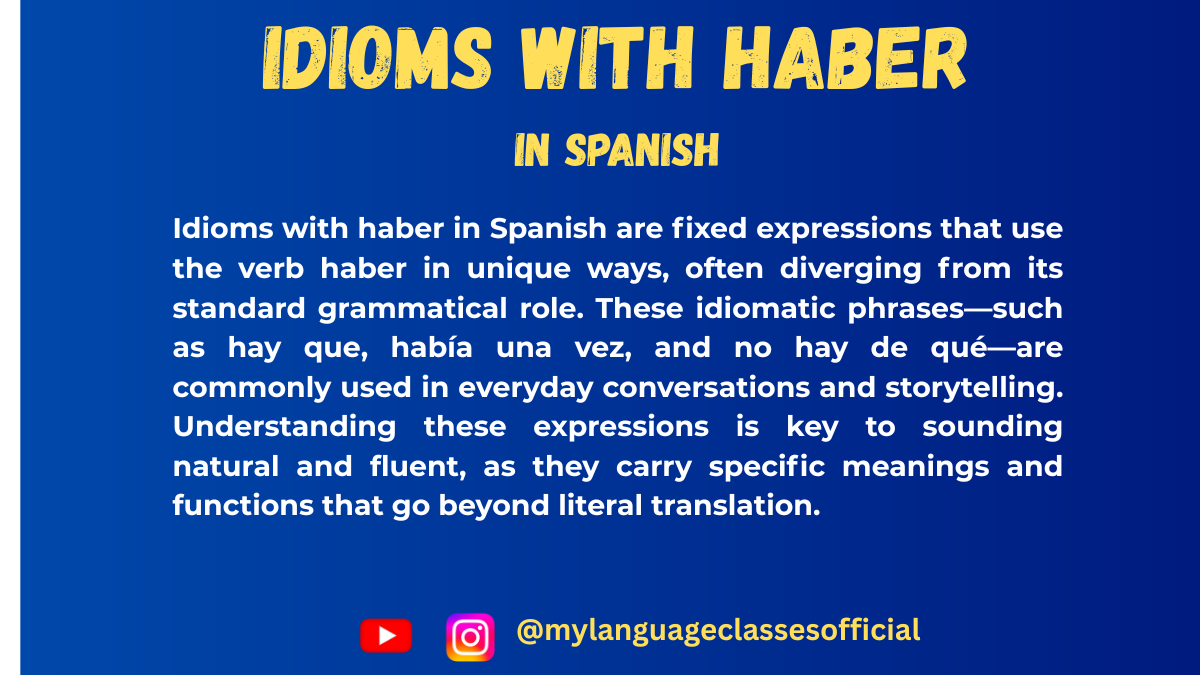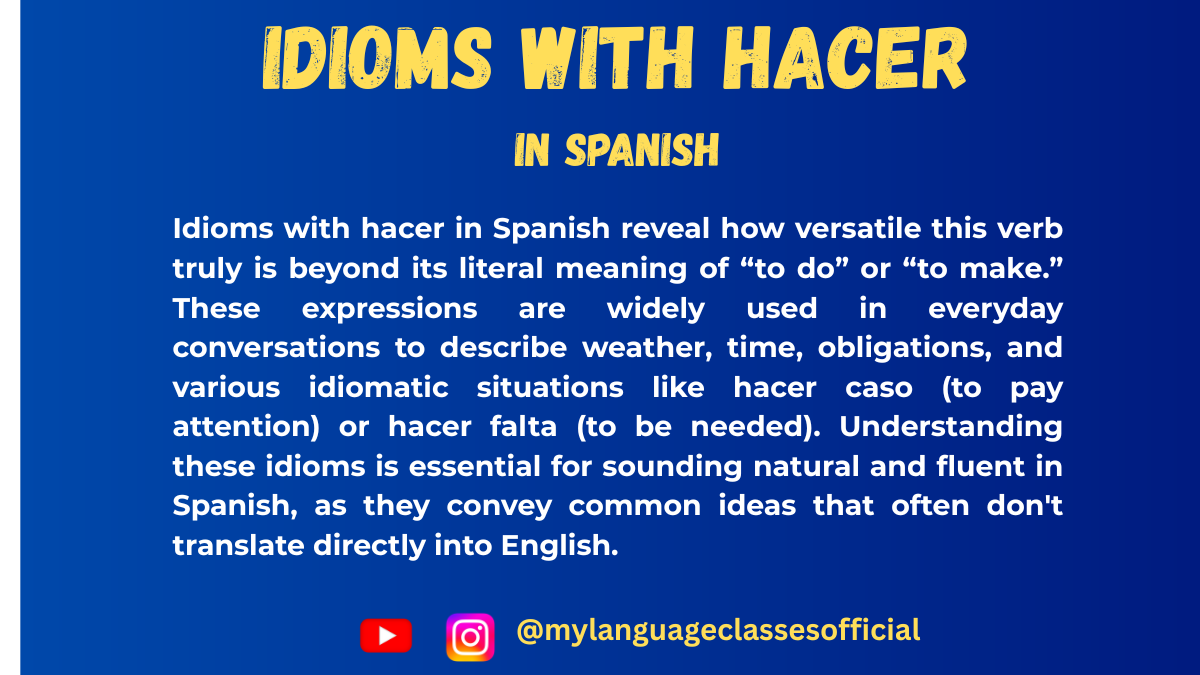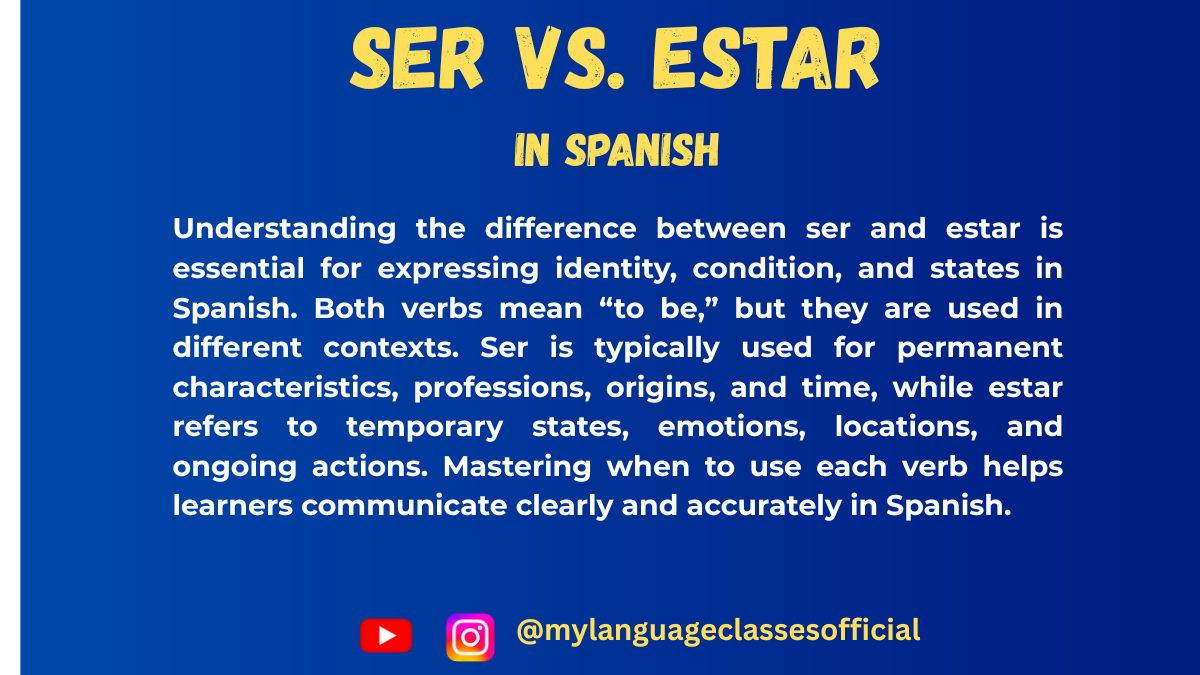Your cart is currently empty!
Category: Spanish – Intermediate
Welcome to the Spanish – Intermediate section of My Language Classes! 🚀
This section is designed for learners who already know the basics and are ready to level up their Spanish skills. If you can form simple sentences, hold short conversations, and understand basic grammar—you’re in the right place!
Here, you’ll find:
Intermediate grammar lessons (like past tenses, reflexive verbs, and prepositions)
Rich vocabulary to expand your range of expression
Common idioms and expressions used in real-life conversations
Practice activities to build fluency and confidence
Listening and reading exercises to boost comprehension
These lessons will help bridge the gap between beginner and advanced, getting you closer to natural, confident communication—whether you’re preparing for DELE B1/B2 or just want to speak like a native.
Keep learning, stay curious, and let’s grow your Spanish together. ¡Vamos al siguiente nivel! 🇪🇸✨
-
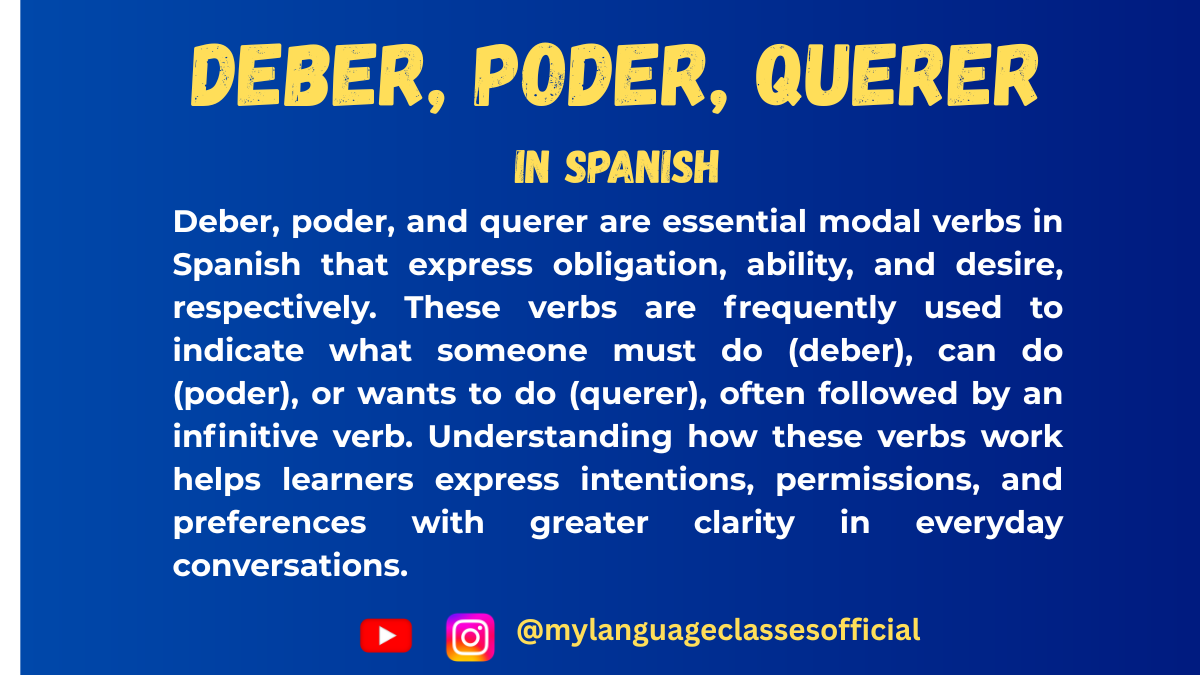
Mastering Deber, Poder and Querer in Spanish
Deber, Poder, Querer: Expressing Obligation, Possibility, and Desire in Spanish
In Spanish, the verbs deber, poder, and querer are commonly used to express obligation, possibility, and desire, respectively. Understanding how to use these verbs correctly is essential for fluent communication. In this blog post, we will explore their meanings, conjugations, and common expressions used in daily life.
1. Deber – Expressing Obligation
The verb deber translates to “must” or “should” in English and is used to indicate duty, necessity, or moral obligation.
Common Expressions with Deber
- Deber + infinitivo → “Must/should do something.”
- Debo estudiar para el examen. (I must study for the exam.)
- Debes comer más verduras. (You should eat more vegetables.)
- Deber de + infinitivo → Expresses probability or supposition.
- Debe de estar en casa. (He/She must be at home.)
Conjugation of Deber
Tense Conjugation Present Indicative debo, debes, debe, debemos, debéis, deben Preterite debí, debiste, debió, debimos, debisteis, debieron Imperfect debía, debías, debía, debíamos, debíais, debían Present Subjunctive deba, debas, deba, debamos, debáis, deban Imperative (no direct affirmative imperative; use subjunctive)
2. Poder – Expressing Possibility and Ability
The verb poder means “can” or “to be able to.” It is used to express ability, permission, or possibility.
Common Expressions with Poder
- Poder + infinitivo → “To be able to do something.”
- Puedo nadar bien. (I can swim well.)
- No puedes entrar sin permiso. (You can’t enter without permission.)
- ¿Se puede…? → Asking for permission.
- ¿Se puede fumar aquí? (Can one smoke here?)
- No poder más → “To be unable to handle something anymore.”
- No puedo más con este calor. (I can’t take this heat anymore.)
Conjugation of Poder (Irregular Verb)
Tense Conjugation Present Indicative puedo, puedes, puede, podemos, podéis, pueden Preterite pude, pudiste, pudo, pudimos, pudisteis, pudieron Imperfect podía, podías, podía, podíamos, podíais, podían Present Subjunctive pueda, puedas, pueda, podamos, podáis, puedan Imperative (no direct affirmative imperative; use subjunctive)
3. Querer – Expressing Desire and Intentions
The verb querer means “to want” or “to love.” It is used to express desires, wishes, and sometimes affection.
Common Expressions with Querer
- Querer + infinitivo → “To want to do something.”
- Quiero viajar a España. (I want to travel to Spain.)
- ¿Quieres salir esta noche? (Do you want to go out tonight?)
- Querer a alguien → “To love someone.”
- Te quiero mucho. (I love you a lot.)
- Querer decir → “To mean.”
- ¿Qué quiere decir esta palabra? (What does this word mean?)
Conjugation of Querer (Irregular Verb)
Tense Conjugation Present Indicative quiero, quieres, quiere, queremos, queréis, quieren Preterite quise, quisiste, quiso, quisimos, quisisteis, quisieron Imperfect quería, querías, quería, queríamos, queríais, querían Present Subjunctive quiera, quieras, quiera, queramos, queráis, quieran Imperative (no direct affirmative imperative; use subjunctive)
Key Considerations When Using Deber, Poder, Querer
- Articles and Gender:
- Use el, la, los, las with nouns when necessary.
- Example: Debes respetar las reglas. (You must respect the rules.)
- Plural vs. Singular:
- Conjugate the verb based on the subject.
- Example: Ellos pueden hablar inglés. (They can speak English.)
- Using the Subjunctive:
- Often follows expressions of doubt, wishes, or hypothetical scenarios.
- Example: Quiero que vengas conmigo. (I want you to come with me.)
- Negation:
- Use “no” before the verb to make it negative.
- Example: No debes mentir. (You must not lie.)
Conclusion
Mastering deber, poder, and querer is essential for effective communication in Spanish. These verbs allow you to express obligation, possibility, and desire in various situations. By understanding their conjugations, common expressions, and proper grammatical usage, you will significantly enhance your Spanish fluency. Keep practicing, and soon, you’ll be able to use them naturally in conversations!
If you found this guide helpful, I’d love to hear from you! Share your thoughts in the comments below or connect with me on social media. For more tips, resources, and inspiration, visit my blog at mylanguageclasses.in. Follow on Instagram and subscribe on YouTube
📚 Continue Learning Spanish
- Deber + infinitivo → “Must/should do something.”
-
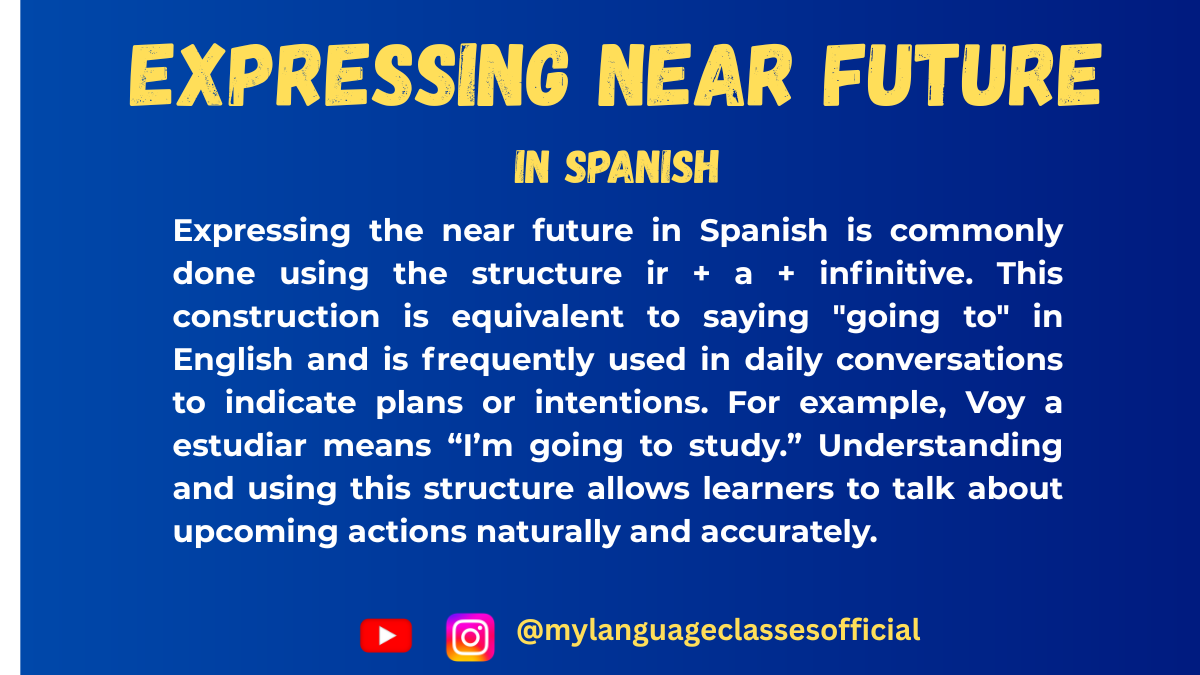
Ir a + Infinitive: Expressing Near Future in Spanish
Ir a + Infinitive: Expressing Near Future in Spanish
In Spanish, the construction “Ir a + infinitive” is commonly used to express actions that will happen in the near future. This is equivalent to the English “going to + verb” structure. It is widely used in spoken and written Spanish and is easier to learn compared to the simple future tense.
Formation of “Ir a + Infinitive”
The structure consists of three elements:
- The verb “ir” (to go) conjugated in the present tense.
- The preposition “a” (to).
- An infinitive verb (unconjugated verb).
Conjugation of “Ir” in Present Tense:
Subject Pronoun Conjugation of “Ir” Yo voy Tú vas Él/Ella/Usted va Nosotros/as vamos Vosotros/as vais Ellos/Ellas/Ustedes van Sentence Structure:
Subject + Ir (conjugated) + a + Infinitive Verb
Example Sentences:
- Voy a estudiar. (I am going to study.)
- Vamos a viajar a México. (We are going to travel to Mexico.)
- Ellos van a comprar una casa. (They are going to buy a house.)
Usage of “Ir a + Infinitive”
1. Near Future Actions
Used to express something that is about to happen soon.
- Voy a llamar a mi madre. (I am going to call my mother.)
- Ella va a cocinar la cena. (She is going to cook dinner.)
2. Intentions or Plans
Used when someone has planned to do something.
- Vamos a ver una película esta noche. (We are going to watch a movie tonight.)
- Voy a aprender español este año. (I am going to learn Spanish this year.)
3. Predictions Based on Evidence
Used when there is evidence that something is about to happen.
- Va a llover. (It is going to rain.)
- El bebé va a llorar. (The baby is going to cry.)
4. Giving Commands or Warnings
Used to give warnings or strong suggestions.
- Vas a romper el vaso. (You are going to break the glass.)
- Van a llegar tarde si no se apuran. (You all are going to be late if you don’t hurry.)
Articles, Gender, and Plural Considerations
When using “Ir a + Infinitive,” remember:
- Definite Articles (el, la, los, las) and Indefinite Articles (un, una, unos, unas) should match the noun in gender and number.
- Example: Voy a comprar una bicicleta. (I am going to buy a bicycle.)
- Example: Vamos a visitar el museo. (We are going to visit the museum.)
- Verb agreement: The conjugation of “ir” changes based on the subject.
- The infinitive verb does not change regardless of the subject.
Common Verbs Used with “Ir a + Infinitive”
Here is a list of common verbs and their “Ir a + Infinitive” forms:
Infinitive Verb Meaning “Ir a + Infinitive” Example Comer To eat Voy a comer pizza. (I am going to eat pizza.) Beber To drink Vas a beber agua. (You are going to drink water.) Estudiar To study Ella va a estudiar matemáticas. (She is going to study mathematics.) Viajar To travel Vamos a viajar a España. (We are going to travel to Spain.) Comprar To buy Van a comprar un coche. (They are going to buy a car.) Hacer To do/make Voy a hacer mi tarea. (I am going to do my homework.) Tener To have Vas a tener una sorpresa. (You are going to have a surprise.) Llegar To arrive Ella va a llegar temprano. (She is going to arrive early.) Jugar To play Vamos a jugar fútbol. (We are going to play soccer.) Dormir To sleep Van a dormir temprano. (They are going to sleep early.) Regular and Irregular Verbs in “Ir a + Infinitive”
All verbs, whether regular or irregular, remain in the infinitive form after “a.”
Regular Verbs (AR, ER, IR Verbs)
- Hablar (to speak): Voy a hablar con mi amigo. (I am going to speak with my friend.)
- Comer (to eat): Vamos a comer paella. (We are going to eat paella.)
- Vivir (to live): Ellos van a vivir en Barcelona. (They are going to live in Barcelona.)
Irregular Verbs
- Hacer (to do/make): Voy a hacer la tarea. (I am going to do the homework.)
- Tener (to have): Ella va a tener una fiesta. (She is going to have a party.)
- Poder (to be able to): Van a poder salir temprano. (They are going to be able to leave early.)
Conclusion
The “Ir a + Infinitive” structure is one of the most practical and commonly used ways to express the near future in Spanish. It is simple to form and widely understood in all Spanish-speaking regions. By practicing this structure with different verbs, you can quickly improve your Spanish fluency and express future plans with confidence.
Now that you understand how to use “Ir a + Infinitive”, start practicing by forming your own sentences!
If you found this guide helpful, I’d love to hear from you! Share your thoughts in the comments below or connect with me on social media. For more tips, resources, and inspiration, visit my blog at mylanguageclasses.in. Follow on Instagram and subscribe on YouTube
📚 Continue Learning Spanish

